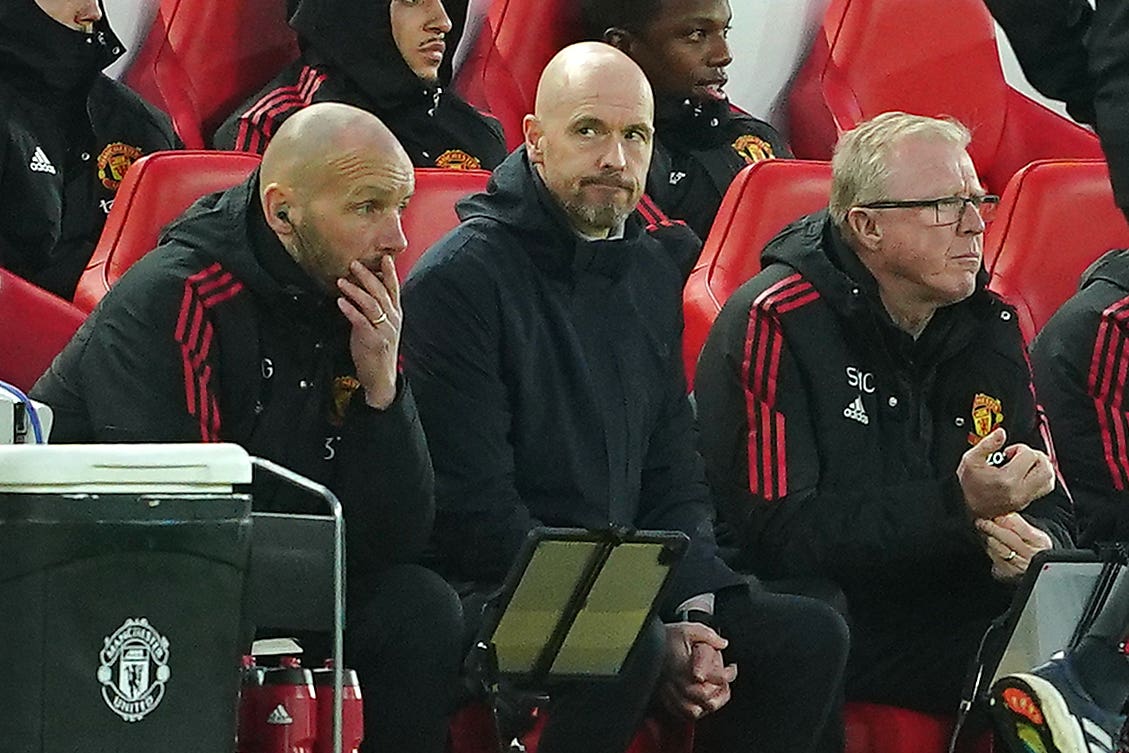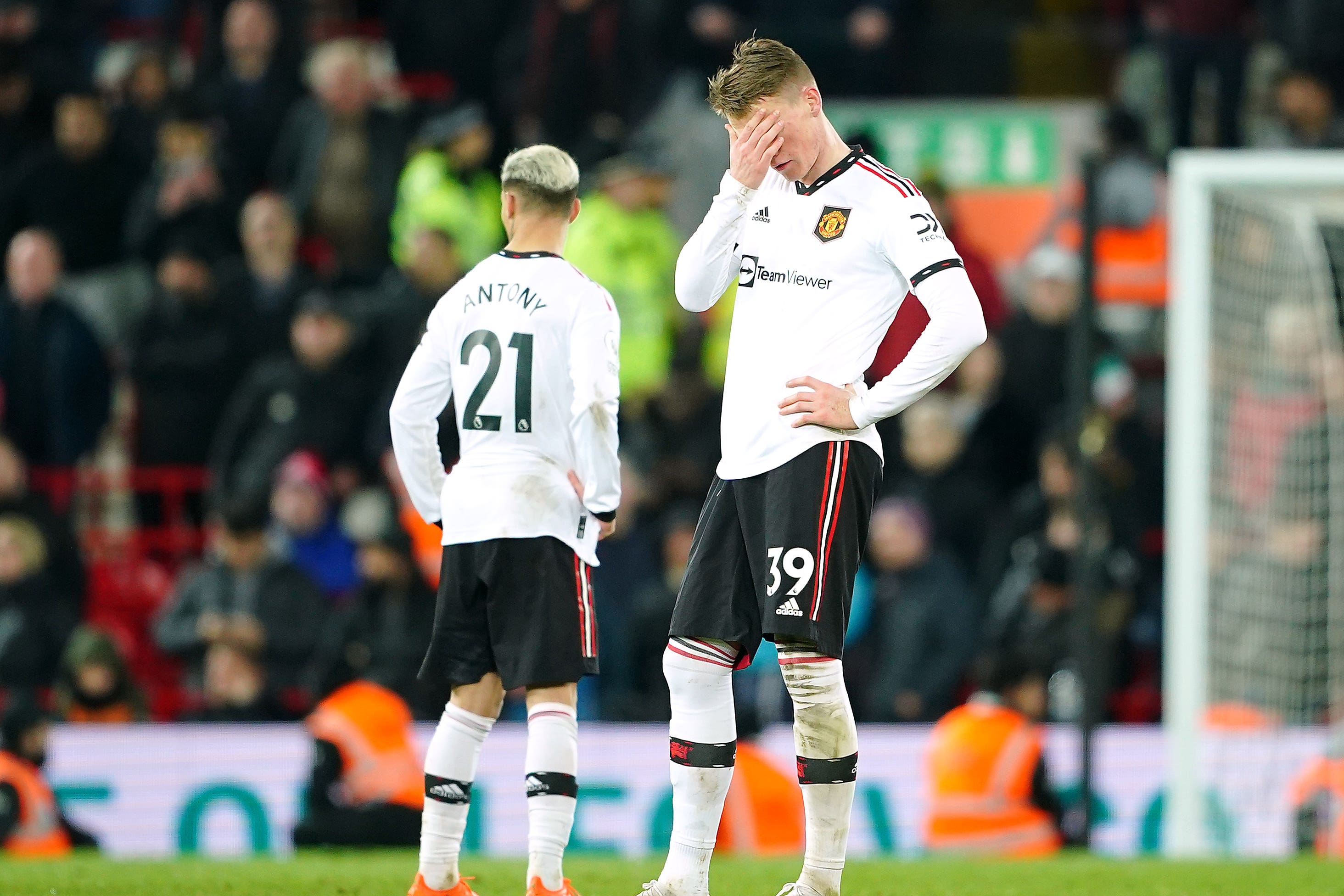Manchester United’s harrowing capitulation at Anfield is much more than a ‘freak’ result
The Red Devils were hammered at Anfield in what represents a reality check after claiming silverware the week before in the Carabao Cup final

Your support helps us to tell the story
This election is still a dead heat, according to most polls. In a fight with such wafer-thin margins, we need reporters on the ground talking to the people Trump and Harris are courting. Your support allows us to keep sending journalists to the story.
The Independent is trusted by 27 million Americans from across the entire political spectrum every month. Unlike many other quality news outlets, we choose not to lock you out of our reporting and analysis with paywalls. But quality journalism must still be paid for.
Help us keep bring these critical stories to light. Your support makes all the difference.
“Freak result,” said a manager. The winning manager, actually. Perhaps only Jurgen Klopp could say it, and perhaps Erik ten Hag was unwise to voice the opinion his side were the better team in the first half. Not when it finished Liverpool 7 Manchester United 0.
“I don’t have an explanation,” said a seemingly shellshocked Ten Hag. He could be forgiven for finding answers elusive. United were unbeaten in 11 games, with a solitary loss in 22 matches in all competitions, with the most points since the World Cup. A day that perhaps promised to bring the end to their Anfield hex instead brought the wrong sort of statement result. It was United’s heaviest defeat since 1931.
“It is a surprise for me, I didn’t see this [coming] from my team,” said Ten Hag. In truth, few did. United’s 5-0 and 4-0 eviscerations by Liverpool last season were damning in their predictability; they were shocking yet unsurprising, revealing of the deeper problems that were all too evident.
This might have been an oddly excellent afternoon for Harry Maguire and Paul Pogba, Ralf Rangnick and Ole Gunnar Solskjaer, who were not involved in a still heavier loss, but it could appear an aberration. After all, Klopp’s Liverpool conceded seven goals to Aston Villa in 2020 and did not lose again in the league for three months. Sir Alex Ferguson’s United lost 6-1 in a derby in a season when they got 89 points.
But when Ten Hag’s United were beaten 4-0 by Brentford, it was indicative of the malaise at Old Trafford. The manager ran 13.8 kilometres with his work-shy players on a punishment run the following day. He dropped Cristiano Ronaldo and Maguire. When they lost 6-3 to Manchester City – and Anthony Martial’s two late goals gave a flattering sheen to the scoreline – they could say in mitigation that Raphael Varane went off injured in the first half. Ten Hag responded by bringing Casemiro into the starting 11 a week later. Each was a turning point in the development of a team, but the side humiliated at Anfield was, with the possible exception of Jadon Sancho, the strongest available. Maybe there is no shock therapy, no one to bring in a radically improve the side.
Perhaps it was just out of character from a side who had seemed blessed with characters. United had been tough, spirited, organised, the comeback kings. Until, suddenly, they weren’t. “I have seen the last weeks and months this team is resilient and has a winning attitude,” Ten Hag said. “Second half we didn’t have a winning attitude at all. We didn’t stick to the plan and we didn’t do our jobs.” He lamented a lack of tracking back and the way United stopped being, well, united. “It is unprofessional,” he added. “They didn’t cooperate together anymore and they didn’t fulfil their jobs. There was no team anymore. We didn’t stick to the plan. There were 11 individuals.”
Even then, those individuals were of such a calibre to render the result still more improbable. Lisandro Martinez is not the first Argentinian World Cup winner to lose 7-0 at Anfield – Ossie Ardiles and Ricky Villa’s memories of 1978 do not just include global glory – but Mohamed Salah left him on his backside in the build-up to the third goal.

Others were equally culpable in the disastrous second half. Casemiro, Varane and Luke Shaw all lost the ball for the second goal. Antony was dispossessed all too easily for the fourth before the hapless Scott McTominay deflected the ball to Salah. Darwin Nunez escaped Varane head in the fifth. Shaw cleared the ball into Roberto Firmino for Salah to score the sixth, though Tyrell Malacia had hardly helped by neglecting to close down Harvey Elliott in the build-up. David de Gea was nutmegged for the seventh.
De Gea basically did not save anything; eight shots on target brought seven goals, which supported Klopp’s suggestion it was a freakish scoreline. Bruno Fernandes somehow escaped a caution when losing his cool but the captain’s was not a constructive response to a blitz of Liverpool goals. “The team tries to react but in an erratic way,” he admitted. He reacted in a petulant way.
Ashen-faced, barely audible at times, Ten Hag was heavily critical of his team without identifying particular offenders. “This is unacceptable,” he said. “But also it is only one game.”

Which is true in the context of the last five months, but not if previous events are factored in. Perhaps there was an element of post-traumatic stress disorder for the survivors of last season, for the players embarrassed by Liverpool and City, Leicester and Watford and Brighton.
Conceding seven goals in 45 minutes at Anfield was extreme, but United let in six in 56 minutes at the Etihad Stadium, four in 25 to Brentford, two in nine in Ten Hag’s opening defeat to Brighton. On Merseyside, they rewound time even further, conjuring a scoreline United had not suffered since before most of the Busby Babes were born. Is it fragility, a flaw that could occur again or a one-off? A capitulation in a season of transformation may be an isolated disaster. But even if it is, the fact it came at Anfield and to Liverpool should render it harrowing.



Join our commenting forum
Join thought-provoking conversations, follow other Independent readers and see their replies
Comments